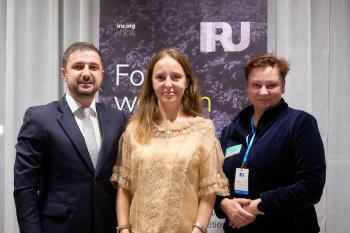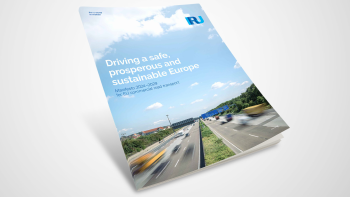With the new European Commission’s leadership preparing to take office, collaboration between legislators and industry is key to advancing road transport. The IRU EU Manifesto offers a clear roadmap to unlock the sector’s potential for innovation, increased efficiency and sustainability.
By prioritising collaboration and targeted solutions, the EU’s leadership has a unique opportunity to deliver on a future where road transport continues to drive economic growth and connect people and businesses while advancing Europe’s sustainability ambitions. The IRU EU Manifesto outlines the clear pathway needed for turning ambition into action.
IRU EU Advocacy Director Raluca Marian said, “The strong support from the European Parliament and Commission is a vital step towards building a modern and resilient road transport sector, with digitalisation and transport efficiency at its core.”
“Digitalisation, in particular, offers transformative potential by increasing transparency and reducing costs for businesses and ultimately consumers,” she added.
This collaborative approach can drive forward key initiatives, such as promoting digital tools to streamline operations, revising the Weights and Dimensions Directive, and a better incentive regime for combined transport.
Digitalisation stands at the forefront of transforming road transport, offering unprecedented opportunities to enhance efficiency, safety and environmental performance. The IRU EU Manifesto highlights key priorities, including fully digitalising transport documents, harmonising cross-border digital standards, and investing in infrastructure to streamline operations.
“Policymakers, including Members of the European Parliament (MEPs) and the new Commissioner for Transport, Apostolos Tzitzikostas, have already recognised the transformative potential of digitalisation to modernise road transport and contribute to climate goals,” said Raluca Marian.
Commissioner Tzitzikostas highlighted during his European Parliament hearing that digitalisation is essential to improving efficiency and addressing inefficiencies in the transport system. This sentiment was also echoed during the IRU EU Manifesto Dinner Debate, where industry leaders and policymakers came together to advocate for immediate action on digital transformation.

Committee on Transport and Tourism (TRAN) MEP Andrian-George Axinia said, “I am a strong supporter of accelerating digitalisation. Full digitalisation involves modernising our transport infrastructure by improving efficiency, safety and being environmentally friendly.”
“Governments and public authorities must support the private sector in transitioning to smart solutions. This can be done through funding, research initiatives and public-private partnerships aimed at accelerating the deployment of digital platforms in transport,” he added. (Full remarks available here.)
This was echoed by industry leaders. The Deputy Director of Polish IRU member ZMPD and IRU’s Vice President and President of the Passenger Transport Council highlighted the urgent need for digitalisation in the road transport industry.
ZMPD Deputy Director of Transport Joanna Popiolek said, “The road transport industry urgently needs digitalisation to replace outdated paper-based systems. By digitising transport processes, costs will be reduced, efficiency will improve, and authorities will gain a powerful tool for monitoring and enhancing transparency across Europe.” (Full remarks available here.)
IRU Vice President Patrick Westelinck said, “Despite advancements in technology, bus and coach drivers are burdened with outdated, paper-heavy processes like the European Control Requirement form, which are inefficient and costly.”
“Immediate digitalisation or a complete re-evaluation of such forms is essential to streamline operations and avoid unnecessary penalties,” he added. (Full remarks available here.)

Building on the transformative potential of digitalisation, modernising legislative frameworks like the weights and dimensions and combined transport directives is essential to fully unlock the benefits of innovation. These reforms not only complement digital advancements but also address critical challenges in capacity, sustainability and multimodal logistics, ensuring a cohesive and efficient transport system for Europe’s future.
The Weights and Dimensions Directive plays a pivotal role in improving vehicle efficiency, especially as the sector transitions to zero-emission technologies. Adjusting weight allowances to account for the additional mass of batteries or alternative fuel systems will enable operators to adopt greener vehicles without compromising payload capacity.
Danish MEP Asger Christensen emphasised the importance of these changes during the manifesto debate.
TRAN MEP Asger Christensen said, “We have very good experience with heavier and longer trucks in Nordic countries, and we would like to continue doing that.”
“I hope my colleagues and EU Member States will soon come to an agreement on the revision of the Weights and Dimensions Directive,” he added. (Full remarks available here.)

At the manifesto debate, industry leaders reinforced the importance of revising the Weights and Dimensions Directive to balance sustainability with operational efficiency.
Nordic Logistics Association CEO Torsten Laksafoss Holbek said, “Allowing greater truck weights and longer vehicle combinations is essential for Nordic road transport operators to reduce CO₂ emissions, increase efficiency and lessen road congestion. We urge EU legislators to adopt the revised weights and dimensions legislation to support these goals.” (Full remarks available here.)

Distinct from the weights and dimensions framework, an updated Combined Transport Directive should streamline intermodal operations and encourage collaboration between road, rail and waterways. Through an effective framework and incentive mechanism, the EU can create a transport network that is not only sustainable but also better equipped to handle the growing demands of mobility and trade.
TRAN MEP Daniel Attard said, “The Commission's proposal is a positive step towards supporting combined transport for climate goals. But it falls short in addressing the unique challenges faced by island nations like Malta.” (Full remarks available here.)
Achieving a smarter and more efficient road transport sector requires bold action and a shared commitment. Collaboration between policymakers, industry leaders and other stakeholders will be essential to implement targeted reforms and innovative solutions.
With strong support from the new European Commission and European Parliament, the road transport sector can rise to the challenges ahead and continue driving Europe’s sustainability and economic growth.

